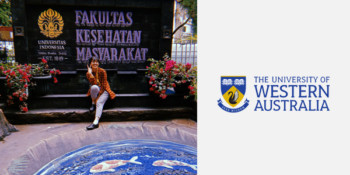Claire Chua is a New Colombo Plan Mobility Grant recipient from the University of Western Australia. Claire undertook the Public Health Study Tour in November-December 2019.
Q: Why did you decide to undertake ACICIS’ Public Health Study Tour?
I decided to take the program because I am currently studying an undergraduate health major and wanted to gain more knowledge on how health systems are affected by different social, cultural and demographic conditions. When I found the PHST program, I realised it ticked all of my boxes: it was intensive, diverse, and educational.
Q: Did you receive a New Colombo Plan Mobility Grant? If so, how did this contribute to your experience in Indonesia?
Yes, I did! Being an undergraduate student with limited funds, the $3000 grant undoubtedly helped to ease some of the financial load associated with the trip. I would definitely recommend the grant to any eligible student thinking of going on the PHST! Additionally, the short online training program that came along with the grant helped me to prepare for a different cultural experience.
Q: What did you find to be the most challenging about your experience on the PHST?
I would probably say that my greatest challenge was a double-edged sword – the language barrier. Not all Indonesians can speak English fluently, and it helps to use simpler words and shorter phrases to convey a point. However, I would say that this language barrier actually helped me to pick up Bahasa Indonesia a lot quicker! I was able to practice my Indonesian at every opportunity – in taxis, at the hotel, and at shops. Many of the locals are also happy to teach you a few handy phrases if you strike up a conversation with them!
Q: What public health issues in Indonesia have you become more interested in/aware of as a result of this tour?
The experience has been extremely holistic and well-rounded – I have become much more aware of public health issues in general. However, there were a few that stood out to me: the decentralisation of the Indonesian healthcare system, sustainability, maternal and reproductive health, drug rehabilitation, and microbiological techniques in controlling communicable diseases. Despite studying Microbiology, I found that there was never a dull moment being exposed to other facets of healthcare. What these issues have taught me is that health is not an isolated, discrete issue but an extremely complex web of issues in society.
Q: Which was your favourite field trip?
My favourite would probably have to be our visit to the drug rehabilitation centre in Jakarta. At the centre, we were able to converse directly with both the staff and patients. We were exposed to a different perspective of the issues surrounding drug use in Indonesia, and I hadn’t expected to be this moved by the few hours that we spent there. It was definitely an experience that I will carry with me into the future as an emerging health professional.
Q: How do you think the Public Health Study Tour will influence your future career or studies?
The PHST has exposed me to how demographics, geography, and culture can influence public health issues. Specifically, it has piqued my interest in the cultural aspects of the Asia-Pacific and how health systems function in the multitude of nations there. I will definitely be looking to broaden my insights into these issues in the future!
Q: What did you most enjoy about the seminar series?
I enjoyed getting to learn so much in such a short period of time! Being taught by experts in a range of fields was extremely eye-opening. The Indonesian lecturers were all more than happy to discuss topics, share their perspectives, and give us a different lens through which we could view health. Their knowledge, warmth, and friendliness was something that I really appreciated in my time there.
Q: What was your favourite aspect about visiting Indonesia?
Undoubtedly, my favourite aspect was the people and culture! Indonesian culture needs more international recognition for its diversity, nuance, and richness. I quickly learnt that despite their intra-national cultural and religious diversity, Indonesians from all walks of life are always more than happy to lend a helping hand. Every individual or community that I had come into contact with was friendly and welcoming, and this is my largest personal takeaway from the tour.


